© Thijs van Reeuwijk
Six TU students and two alumni won medals at the Paris Olympics. Students Jan Driessen (3×3 basketball) and Justen Blok (hockey) took gold. Alumna and sailor Annette Duetz also secured a gold medal. Rowers Laila Youssifou, Tessa Dullemans and Roos de Jong (quadruple sculls) and Ralf Rienks (Holland Eight) won silver, as did alumnus Stef Broenink (double sculls). Delft researchers also contributed to Dutch success with their innovations. Aerodynamics expert Wouter Terra was involved in the new cycling outfit that won ten medals. Terra also developed a cut-resistant suit for kiteboarder Annelous Lammerts with which she won bronze.
OWee
True to tradition, the OWee (Introduction Week) and IP (Introduction Programme) for new Delft students took place at the end of August. The first Sunday, 2987 participants turned up at the OWee. 1235 Master’s, exchange and transfer students enrolled in the Introduction Programme. Leek smacking, karayoga, Bob Rossing, singing, secondhand bike market, OWaterlympics. The Delft University Fund also encouraged students to become friends of the TU Delft for Life community, by giving them a free TU hoodie. This strategy was successful: the fund welcomed 1,500 new student friends.
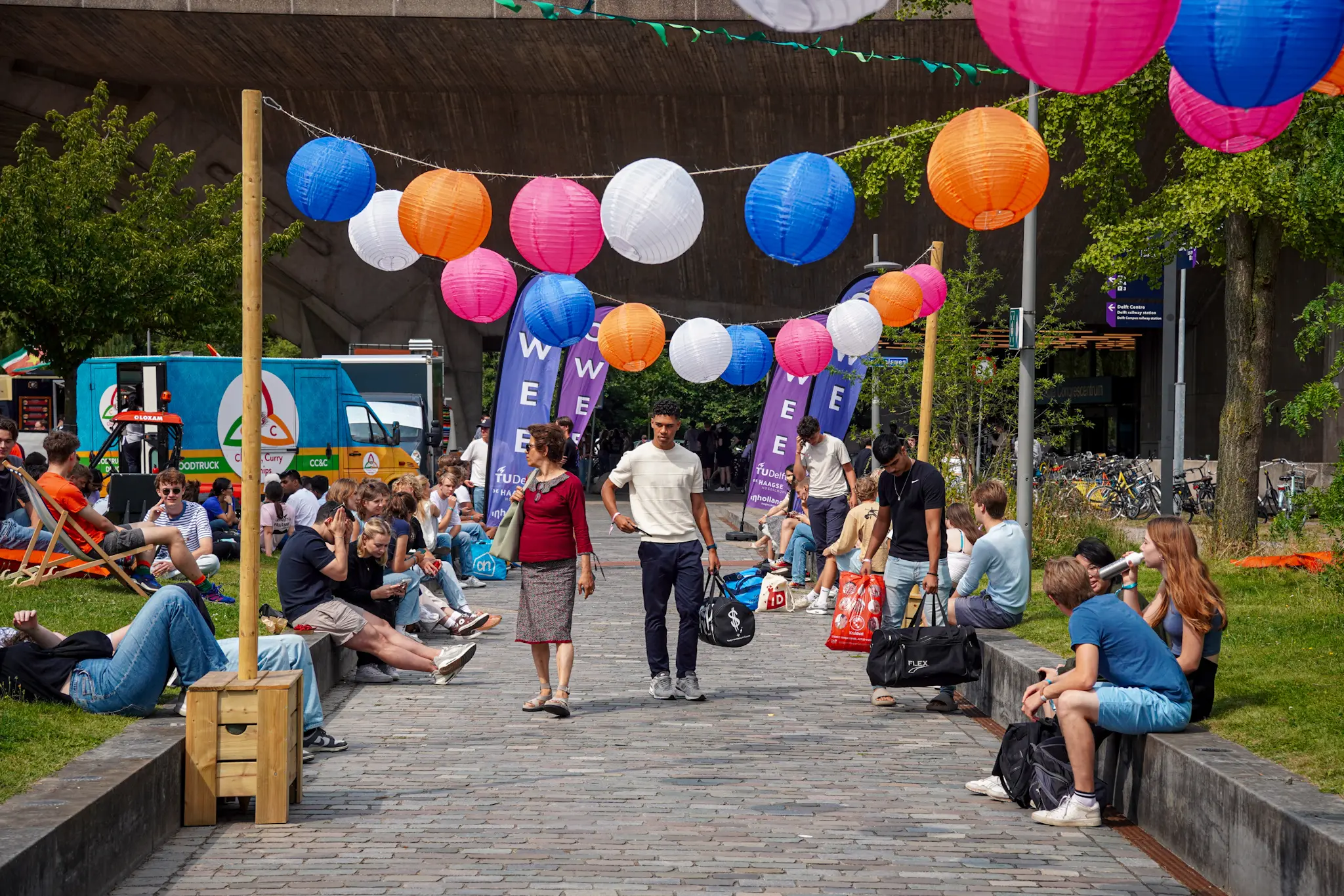
© Thijs van Reeuwijk
© Jaden Accord
Ibo van de Poel (Antoni van Leeuwenhoek professor, Integrity Officer at TU Delft and Scientific Director of the Delft Design for Values Institute) has been awarded the Professor of Excellence Award. The Professor of Excellence Award is given annually to a professor who excels in both research and teaching. “I am proud that I can inspire people to become their intellectual selves,” he said in an interview in Delta.
In September, Delta spoke to Rector Magnificus and Executive Board President Tim van der Hagen about the social safety change plan that was labelled insufficient by the education inspectorate last July. “My pitfall before the summer was the classic engineering approach: identify the problem, then the method for solving it, and then tick the boxes,” he says. “But this is a change of culture that we must keep pursuing. We have to say goodbye to jerks.” TU Delft must send a progress document to the Education Inspectorate every three months. In October, the document included action items such as theatre performances, working conferences and walk-in meetings with the Executive Board, deans and directors. A hotline and an aftercare office are to be set up and a new code of conduct is being drawn up.

European grants
Five TU researchers have each received a European Starting Grant of €1.5 million. Starting Grants are intended for postdoctoral researchers at the beginning of their academic career. A Starting Grant will allow them to set up their own team and spend five years on research. The scientists are conducting research in the areas of soft robots; climate-energy-economic models; turbulent flows; neurogenerative diseases and manipulation by AI.
© Thijs van Reeuwijk
Supertool
By combining two optical examination techniques, molecular biologists can now examine thousands of DNA variations simultaneously. That means a huge acceleration in genetic and biological research. “Traditional techniques that can examine one sequence at a time usually take hours per sequence. With Sparxs (singlemolecule parallel analysis for rapid exploration of sequence space), we can measure millions of molecules within a day to a week,” says researcher Prof Chirlmin Joo (Applied Sciences).
It took Dr Ivo Severins and Dr Carolien Bastiaanssen one year to determine whether combining the techniques was feasible, another four years to develop a working method, and then two years to ensure the accuracy and consistency of the measurements.
Beer bottles
Since this summer, Delft counts five fewer student rooms: after thirty years, student house Lorna te George is no more. The owner has sold the house. This meant that a collection of nearly 1,700 beer bottles was in danger of becoming homeless. First-generation resident Orio Kieboom found it “unbelievable that the beer collection had survived almost thirty years of student accommodation unscathed”. The original paint was even on the walls still and the WiFi password Sjorsdekat had never been changed even after the death of the house cat. The beer bottles were saved in the nick of time. An enthusiast who collects labels picked them up.
Gowns for everyone
As of this academic year, all Doctoral Committee members will have to wear a gown during the doctoral ceremony in which a doctoral candidate defends their dissertation. Until quite recently, only full professors could do so. TU Delft is the only university in the Netherlands to make this ceremonial dress mandatory. The Board for Doctorates introduced the new policy to project unity, says Bart van Arem, who as Pro Vice Rector Magnificus for Doctoral Affairs is responsible for the rules regarding doctoral dissertation defences. “The doctoral defence is an important point in which the candidate takes their place in academia. The ceremonial side demonstrates the value that TU Delft attaches to that moment.”
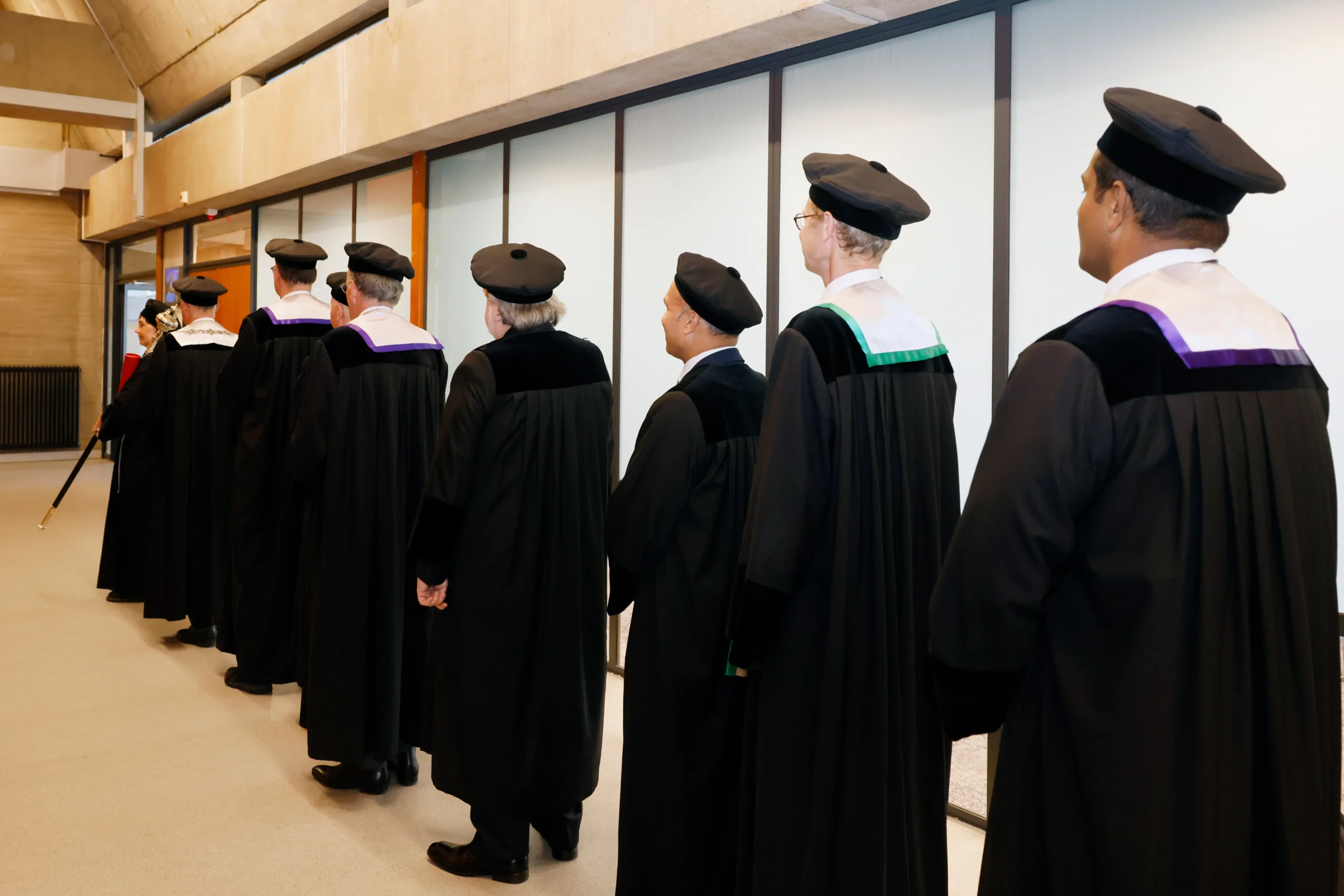
© Roy Borghouts Fotografie
Waiting for the tram
Twenty years ago, TU Delft agreed to a tram line being built across campus. The route was to become part of a fast link from Leidschendam to the campus. According to the current schedule, the first trams should run by the summer of 2026. The causes of the delay were manifold. They included vibration and radiation studies because the route passes sensitive laboratories; the Sint Sebastiaansbrug had to be tram-proofed; the rails that were laid proved unusable and had to be removed; cables proved to be non-compliant and the special concrete was difficult to work with.
© Sam Rentmeester
Summit Grant
Research funder NWO (Dutch Research Council) has launched a new grant for world-class research groups: the Summit Grant. € 75.4 million will go to two Delft projects. One of these, Evolf (Evolving Life from Nonlife) has received 40 million euros in government funding. The Evolf team aims to build a living synthetic cell that can autonomously replicate, communicate and evolve, their goal being to answer ‘some of the biggest questions’. In addition, € 35.4 million will go to QuTech, a research consortium of TU Delft and Leiden University on the fundamental limits of quantum mechanics.
Oldest PhD candidate
Hans van Duivendijk was 89 when he defended his PhD thesis on the ongoing battle against water on 17 June. As an engineer, he was able to use simple means to build complex water management systems in countries such as Bangladesh, Ghana and Nigeria. He did so using techniques he had learnt while closing sea holes after the 1953 flood disaster. For instance, he made sinkers from palm leaves and bamboo. Due to his exceptional work experience, Van Duivendijk became an assistant professor of energy hydrology at TU Delft in 1986. In 2018, he began his PhD research on the history of repairing dyke breaches and closing tidal channels by simple means.
© Thijs van Reeuwijk
It’s the same yet different every year: the annual design competition for first-year Mechanical Engineering students. This year, there were more than a hundred groups of up to six students each that were tasked with making a mechanical crate stacker. This machine had to make the highest possible stack of empty crates within ten minutes by continually adding a crate to the bottom of the stack. At the start of the design project, the students had been given two different electric motors to experiment with. On 12 June, the teams demonstrated their work of the previous five months.
© Marjolein van der Veldt
In September 1864, the Department of Mechanical Engineering and Shipbuilding was established. The department then had nine students: Eight for Mechanical Engineering and one for Shipbuilding. After 1890, the number of students grew thanks to the industrial revolution and the increasing use of steam engines. In 1921, Stanny Koopman became the first woman to graduate in Mechanical Engineering. 160 years after its foundation, in September 2024, the faculty – which now simply goes by the name Mechanical Engineering – has around five thousand enrolled students.
Marina van Dammebeurs
Natalia Vtyurina has been awarded the Marina van Damme Grant for 2024, an award given annually to a talented female Delft alumnus. Second place was for Marjolijn Heslinga (Faculty of ME), the third for Jessica Sun (Faculty of TPM). Vtyurina (Faculty of Applied Sciences) wants to use the scholarship to make a coordinated switch from the business world to government and politics. Haslinga contributes to the food transition to plant-based proteins and therefore wants to increase her knowledge of transition management. Sun is making an effort for the non-profit organisation she founded, ‘Let the Sun Shine’ where technology is made available to a wide audience. The grant is made possible by Marina van Damme. She studied at TU Delft and obtained her PhD as the first female engineer in Twente.
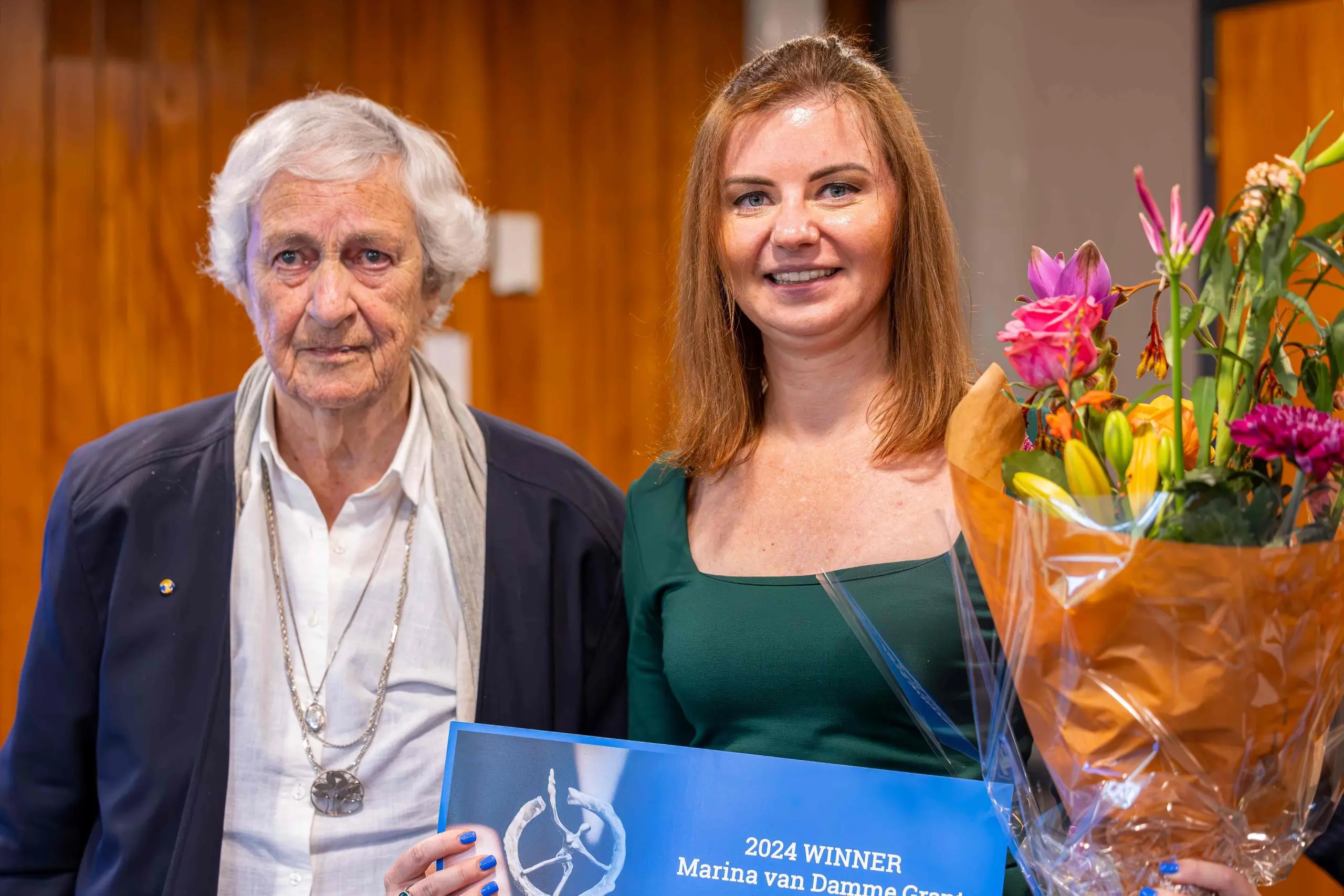
© Robert Kroonen
Vice-president to leave
“You could say that I had one big hobby over the years, and that was TU Delft,” says Rob Mudde in a farewell interview in Delta. On 1 October, he stepped down as Vice-President of the Executive Board and Vice Rector Magnificus. Looking back, he sees that things are more difficult for students of this generation than for those in previous generations. “It is a hard time to live in when you are young. They have difficulty dealing with freedom of choice and fear of missing out.” He always taught alongside his work as a Board member and will continue to do so until his retirement. Because he finds it “really great”. “I prefer to teach first-year students. You can really help these young people along into the next phase.”
Students build
airplane
In the aircraft manufacturing laboratory course, students build a real aircraft from a kit. This teaches them to work responsibly, to strictly follow the assembly instructions and to contact the manufacturer if there are any ambiguities. Before they are allowed to approach the plane at all, the students each must make their own riveted aluminium toolbox. Some 130 Master’s students have worked on the aircraft since 2017. “When the plane is finished,” says teacher Joris Melkert, “we’ll probably fly it around for a while and then sell it to finance a new kit.”
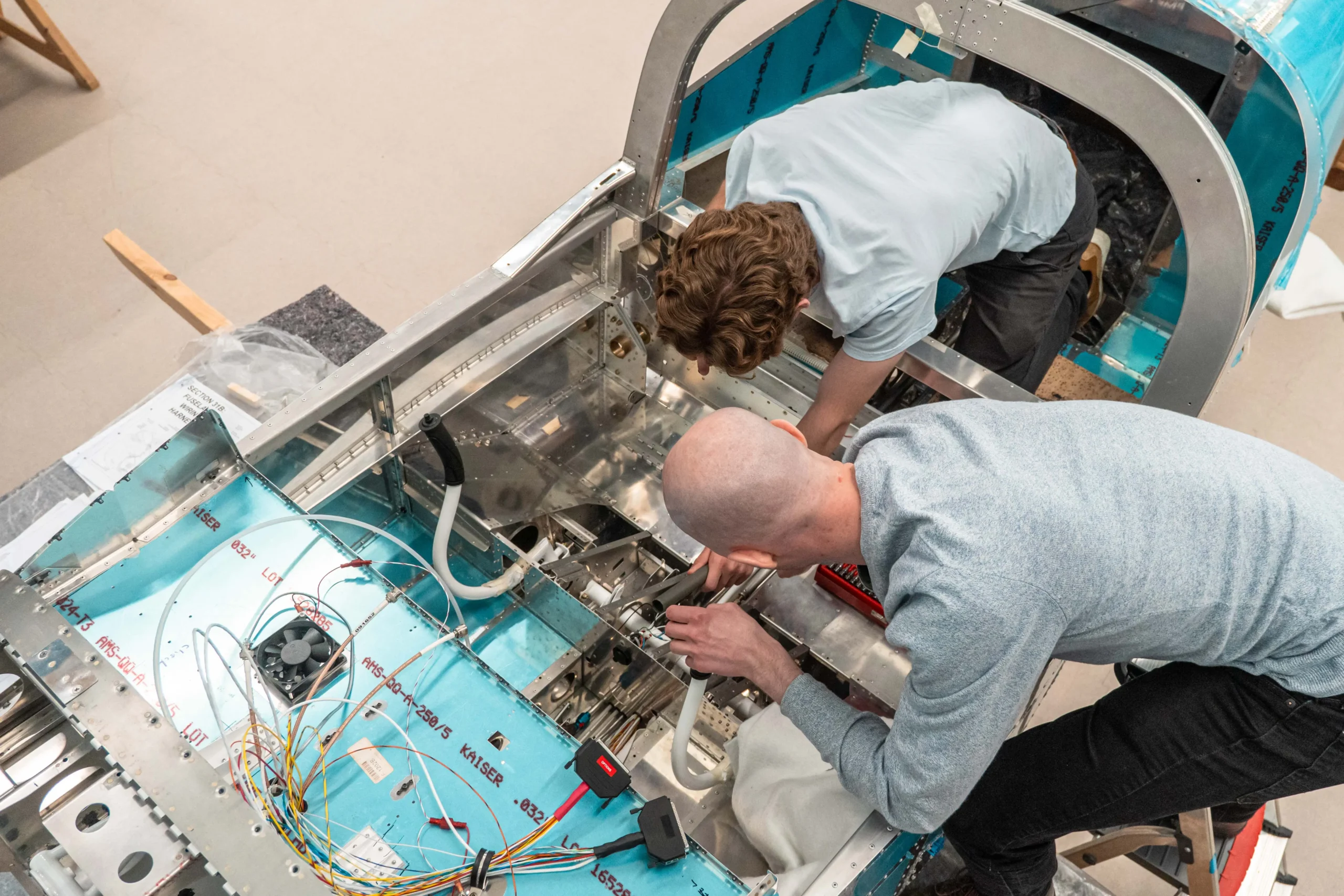
© Thijs van Reeuwijk

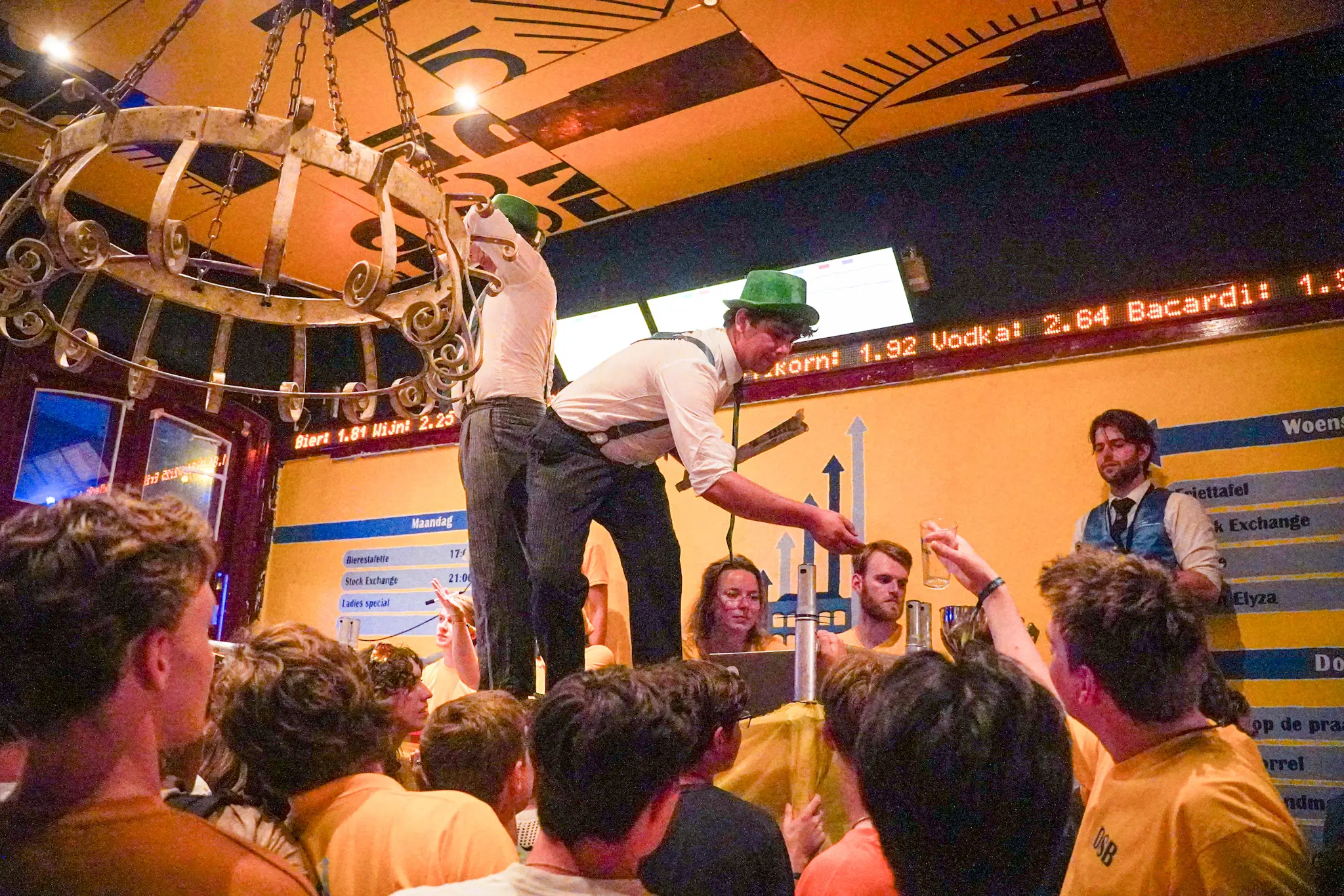
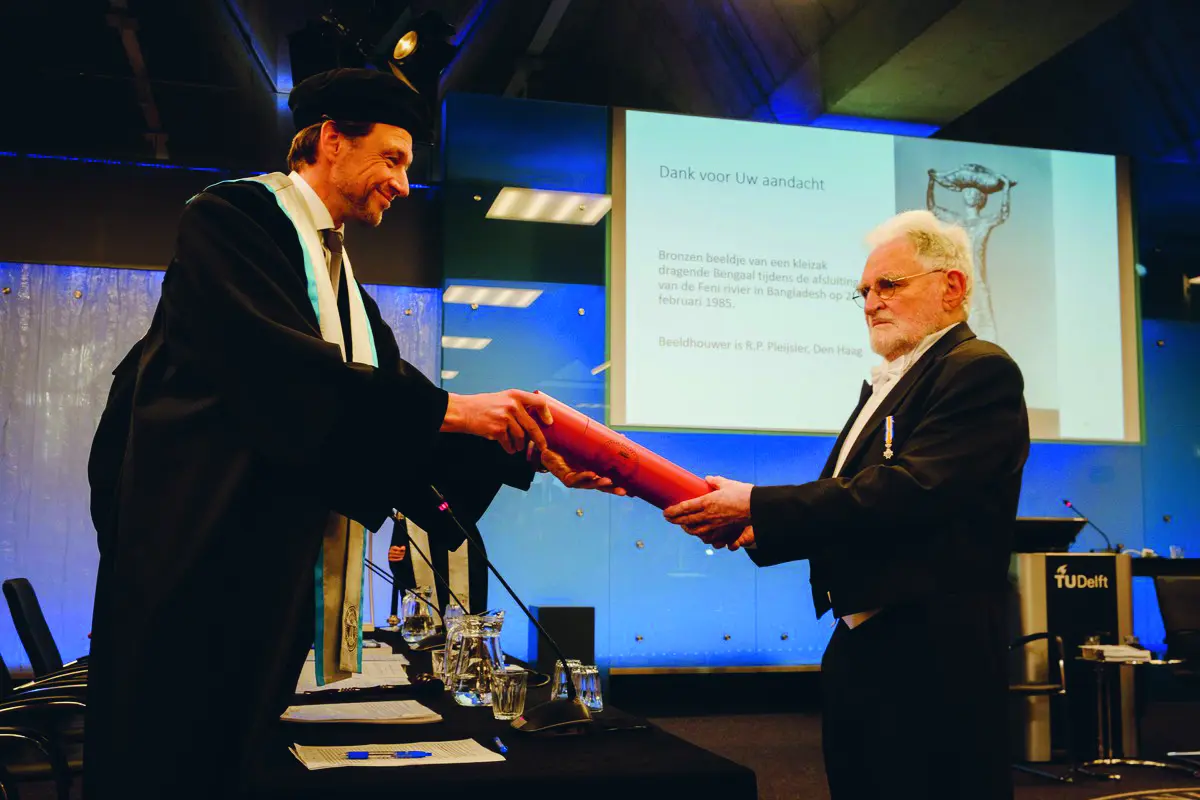
Social safety